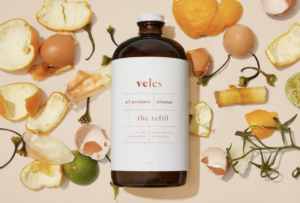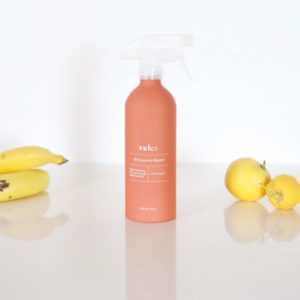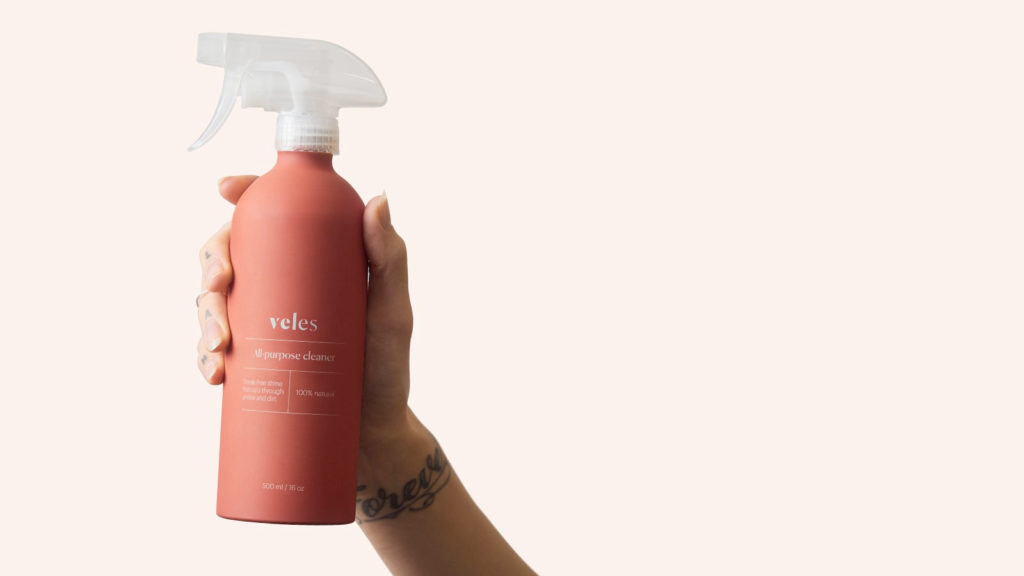Veles — Finding Innovative Solutions in Circular Manufacturing
 To tackle the “take, make, dispose” production of everyday goods and focus on true circularity, there needs to be a shift away from linear manufacturing, which is sending valuable resources and dangerous chemicals through our homes and into the trash. Instead, there needs to be a focus on reducing the resources extracted, the amount of waste created, and finding practical ways to use what is already in circulation.
To tackle the “take, make, dispose” production of everyday goods and focus on true circularity, there needs to be a shift away from linear manufacturing, which is sending valuable resources and dangerous chemicals through our homes and into the trash. Instead, there needs to be a focus on reducing the resources extracted, the amount of waste created, and finding practical ways to use what is already in circulation.
Veles, the flagship product of Ambrosia, a closed-loop manufacturing company, has done exactly this by creating a multi-purpose cleaner from food waste, shipping the product in recyclable packaging, and providing refills in glass bottles when required to minimize waste.
Starting in 2014, Ambrosia developed a revolutionary process to stabilize and isolate compounds of organic material (including water) to create a non-toxic and sustainable cleaning product from food waste. The product, Veles, launched in early 2020 to great success.
Using food waste, water, acetic and lactic acids, and alcohol are squeezed out and then used to create 97% of the multi-purpose cleaner. This process negates the need for virgin resources, namely water, to be extracted, as well as redirects waste from landfill.
 Food waste is the single largest component of US landfills and makes up 22% of all municipal solid waste (MSW). And this organic matter breaks down to release landfill gas (LFG), which is about 50% CO2 and 50% methane, a greenhouse gas that is “28 to 36 times more effective than CO2 at trapping heat in the atmosphere over a 100-year period.” By taking this material and turning it into something useful, Veles is embodying the very core of circularity by not only saving virgin resources but simultaneously reducing waste.
Food waste is the single largest component of US landfills and makes up 22% of all municipal solid waste (MSW). And this organic matter breaks down to release landfill gas (LFG), which is about 50% CO2 and 50% methane, a greenhouse gas that is “28 to 36 times more effective than CO2 at trapping heat in the atmosphere over a 100-year period.” By taking this material and turning it into something useful, Veles is embodying the very core of circularity by not only saving virgin resources but simultaneously reducing waste.
The remaining 3% of ingredients in Veles include essential oils such as lavender, peppermint, and bergamot. What’s more, they use a naturally derived solubilizer to add these oils, keeping Veles safe for both your home and the environment.
The circularity of Veles also includes the packaging, which is made from recycled aluminum. Aluminum is 100% recyclable and retains its properties indefinitely, meaning it can be used over and over again without a drop in quality for a truly closed loop. What’s more, it’s highly durable, with almost 75% of all the aluminum ever produced still in use. In fact, recycling aluminum can save “95% of the energy required to make the same amount of aluminum from its virgin source,” making it the perfect packaging choice for a sustainable product.
Veles looked at the main problems of traditional cleaning products — water usage, chemicals, and waste — and managed to tackle them all with a non-hazardous product made from discarded food. It’s circularity at its best by taking the global problem of food waste and turning it instead into a valuable resource.
What’s the Challenge with “Normal” Cleaning Products?
Thousands of different chemicals from a number of cleaners are washed into waterways every day, many sticking around to enter and work their way up the food chain. For example, the Environmental Protection Agency notes that alkylphenol ethoxylates, a surfactant in many cleaners, can function as an “endocrine disrupter,” negatively impacting reproduction in wildlife exposed to polluted waters.
 In addition to this, common cleaning products contain Volatile Organic Compounds (VOCs) which can have a serious impact on indoor air quality. The EPA states that cleaning and disinfecting products, among many others, “release organic compounds while you are using them, and, to some degree, when they are stored” and that “while people are using products containing organic chemicals, they can expose themselves and others to very high pollutant levels, and elevated concentrations can persist in the air long after the activity is completed.”
In addition to this, common cleaning products contain Volatile Organic Compounds (VOCs) which can have a serious impact on indoor air quality. The EPA states that cleaning and disinfecting products, among many others, “release organic compounds while you are using them, and, to some degree, when they are stored” and that “while people are using products containing organic chemicals, they can expose themselves and others to very high pollutant levels, and elevated concentrations can persist in the air long after the activity is completed.”
Beyond the direct health and environmental impacts, cleaning products also have a significant waste footprint. Most household cleaners are packaged in plastic, mainly PETE, HDPE, or a combination of the two.
While both of these plastic types can technically be recycled, the actual rate of plastic recycling in the US is low. The recycling rate of PET bottles and jars in 2017 was 29.1% and the rate for HDPE natural bottles was 31.2%. What’s more, plastic must be uncontaminated in order for it to be recycled, and the strong chemicals and scents used in household cleaners can hinder the chances of any containers making it through the recycling process.
On top of this excess of waste packaging, these products also take massive amounts of resources to manufacture—mainly water. Water scarcity is an increasing concern, with the World Economic Forum declaring it “one of the greatest challenges of our time”. But, with many cleaning products being more than 90% water, it’s extracted as part of a linear process in which it goes from ground to factory to household and then to the trash, leaving a trail of damage along the way.
To learn more about how Veles and RTS are driving circular solutions, subscribe to the zero waste blog. Additionally, speak to our TRUE Waste Advisors to learn how to make your business’s waste management more sustainable today.

